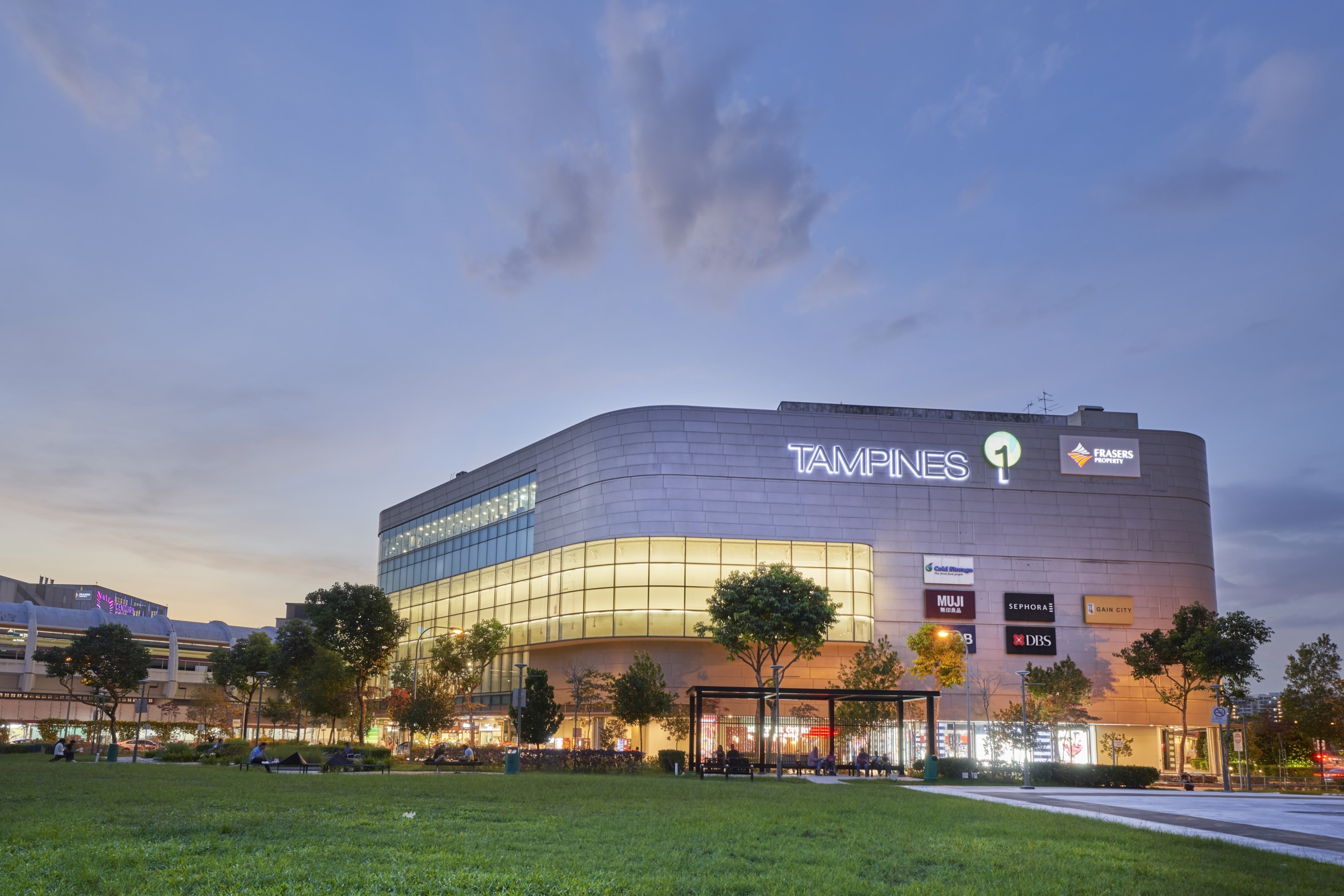06 Jul 2023
Frasers Centrepoint Trust taps OCBC’s green financing solution to accelerate Tampines 1 mall’s move towards carbon-neutrality

- Frasers Centrepoint Trust is first in Singapore to collaborate with OCBC on its green loan offering with carbon credits, which together with its other decarbonisation efforts will enable Tampines 1 to make progress towards carbon-neutral status encompassing all energy-related emissions
SINGAPORE, 6 JULY 2023
Frasers Centrepoint Asset Management Ltd. (“FCAM”), as the manager of Frasers Centrepoint Trust (“FCT”) (the “Manager”), is pleased to announce the partnership with OCBC on Singapore’s first green financing solution that comprises a green loan and carbon credits.
Under the green financing solution, proceeds from the S$419 million green loan will be used for the refinancing of a maturing facility, asset enhancement initiatives, decarbonisation projects such as procurement of energy efficient technology for Tampines 1 and other general corporate purposes. The carbon credits, sourced through OCBC’s Emissions Trading Desk, will go towards investing in Verra or Gold standard certified carbon reduction nature-based projects. The amount of carbon reduced will be equivalent to the financed emissions1 associated with the green loan. FCT will further purchase additional carbon credits to account for the residual and unavoidable Scopes 1 and 2 as well as energy-related Scope 3 emissions2 of the mall’s carbon footprint.
There is a real need for greater industry focus to retrofit existing real estate in the journey towards net-zero emissions, which is considerably more challenging and costly than for new-builds. Real estate account for as much as 70% of a city’s carbon emissions, and two-thirds of existing buildings will still be standing in 2050.3 In addition, real estate is one of six priority sectors OCBC has identified in its decarbonisation roadmap to achieve net-zero for financed emissions arising from its corporate and commercial banking lending portfolio by 2050.
The introduction of this financing solution comes at an opportune time when carbon credits are increasingly considered by corporates to offset residual and unavoidable emissions after taking the necessary steps to reduce their carbon footprint as much as possible. According to Boston Consulting Group4, the voluntary carbon market grew at a record pace in 2021, reaching four times its value in 2020. It expects the market to reach between US$10 billion and US$40 billion by 2030.
Mr Richard Ng, Chief Executive Officer of FCAM, said, “In line with Frasers Property Group’s goal to be a net-zero carbon company by 2050 across Scopes 1, 2 and 3 emissions, FCT continues to explore innovative ways to push forward with our sustainability efforts and reduce our portfolio’s carbon footprint. We are pleased to collaborate with OCBC on this innovative green financing solution that enables us to make further progress in our sustainability journey, particularly as we tackle energy-related Scope 3 emissions, hand-in-hand with our tenants, shoppers and suppliers.”
Ms Elaine Lam, Head of Global Corporate Banking, OCBC, said: “We are committed to developing innovative financing solutions to help our customers realise their sustainability goals, and we are proud to contribute to FCT’s Tampines 1 mall progressing towards carbon-neutrality. This new financing solution will pave the way for us to support green buildings, while directing more capital towards carbon credit generating projects. Through working with FCT and its sponsor Frasers Property Group, we have also achieved a deeper understanding of the sustainability ambitions and needs of our real estate clients, which will allow us to support them better in future.”
Tampines 1 – Making progress towards carbon neutrality
The seven-storey Tampines 1 retail mall with a total net lettable area of 268,514 square feet (as at 31 March 2023) in the eastern region of Singapore has been recertified with the Building and Construction Authority (BCA) Green Mark GoldPLUS status.
The mall’s existing energy efficient features include a chiller plant system that operates under an Energy Performance Contracting framework; motion sensors for lighting in staircases and toilets; rooftop greenery to improve energy efficiency of its chillers; and carbon dioxide sensors to monitor indoor air quality level. In addition, as part of the Frasers Property Group’s initiative, Tampines 1 has installed charging points at designated electric and hybrid vehicle parking lots to support Singapore’s push towards EV adoption.
Active steps at Tampines 1 to further reduce carbon emissions include the installation of solar panels on its roof in the fourth quarter of 2023 to supplement its energy usage with renewable energy. In 2024, the sustainability initiatives will focus on enhancing efficiency throughout the mall through Air-Conditioning and Mechanical Ventilation (ACMV) airside optimisation. The aim is to maintain the highest standards in line with ISO 14001 for resource and waste management and ISO 50001 for energy performance indicators. These efforts will not only contribute to a more sustainable environment but also ensure that the mall operates in an environmentally responsible manner.
Scheduled to be completed and operational by the first half of 2025, Tampines 1, and another FCT mall, Century Square, are part of Singapore’s first brownfield Distributed District Cooling (the “DDC”) network5. This pilot project involving 14 buildings aligns with the Singapore Government’s plans to transform Tampines into Singapore’s first eco-town. According to a white paper by Temasek Group and SP Group, the entire DDC is projected to reduce energy consumption by 17% and carbon emissions by 18% cumulatively across all participating buildings, which will create a more sustainable living environment for the community in the Tampines precinct.
FCT is committed to the Science Based Targets initiative (SBTi) and is in the process of developing science-based targets for submission later this year. The aim is to offset greenhouse gas emissions from the REIT’s operations aligned with the Paris Agreement to limit global temperature rise to 1.5°C.
1 Financed emissions is determined by the proportion of the loan to the asset value against the total emissions that the asset emits.
2 Scope 3: All energy-related emissions for landlord and tenant controlled-area consumption including categories 3 and 13.
3 https://www.bloomberg.com/sponsors/jll/seven-ways-to-retrofit/index.html
4 https://www.bcg.com/publications/2023/why-the-voluntary-carbon-market-is-thriving
